Plantar fasciitis is a common foot condition that is caused by straining the part of your foot that connects your heel bone to your toes. It develops when this area, a thick band of tissue known as the plantar fascia, gets inflamed. The main symptom of the condition is discomfort in the heel, arch and bottom of the foot, which can range from a slight ache to a searing pain. Few factors that cause the condition include being overweight, working a job that involves a lot of standing, exercising on a surface that you are not used too, a previous foot strain and wearing ill-fitting shoes.
Dealing with the pain caused by plantar fasciitis can be challenging but selecting the right footwear, like the best trainers for plantar fasciitis, can make a world of difference. As someone who has suffered from it a lot over the past eight months, I sympathise hugely when other people complain about it. The condition is actually more common than you might think. According to the West Suffolk NHS Trust, around one in 10 people in the UK will get plantar fasciitis at some time in their lives.
What does Plantar fasciitis feel like?
The only way I can describe it is like a deep bruise in my heel that goes between a manageable pain to one that has brought me to tears, and caused me to limp. It is often worse in the morning, due to the foot being at rest for so long overnight, but in my case it can flare up at any point of the day for no reason. And whilst the good news is most cases typically last between six to 12 months (with many people requiring no treatment), I am not out of the woods yet.
You can usually treat plantar fasciitis at home with over-the-counter painkillers, icing, rest and stretching. Many people with the condition also see a physiotherapist which, in my case, has helped me enormously. I have religiously taken on board the stretching exercises my physio has recommended, along with her advice on wearing the best footwear for plantar fasciitis. And this has been the most vital part of my recovery from plantar fasciitis; swapping my every day running shoes and walking boots to ones that offer me ample support and cushioning.
“Wearing the right shoe is crucial for preventing and managing foot aches and pains,” explained my physio Sammy Margo, MSc MMACP, who runs Sammy Margo Physiotherapy which is recognised by London's leading consultants, surgeons and GP’s as a provider of first class physiotherapy care.
“The right shoes can provide arch support, reduce strain on tendons and ligaments, help maintain foot alignment, prevent issues like plantar fasciitis, offer cushioning, absorb shock and protect your joints. In addition to this, good-quality trainers and correct fitting shoes prevent blisters, calluses, and other minor injuries that can lead to more serious problems.”
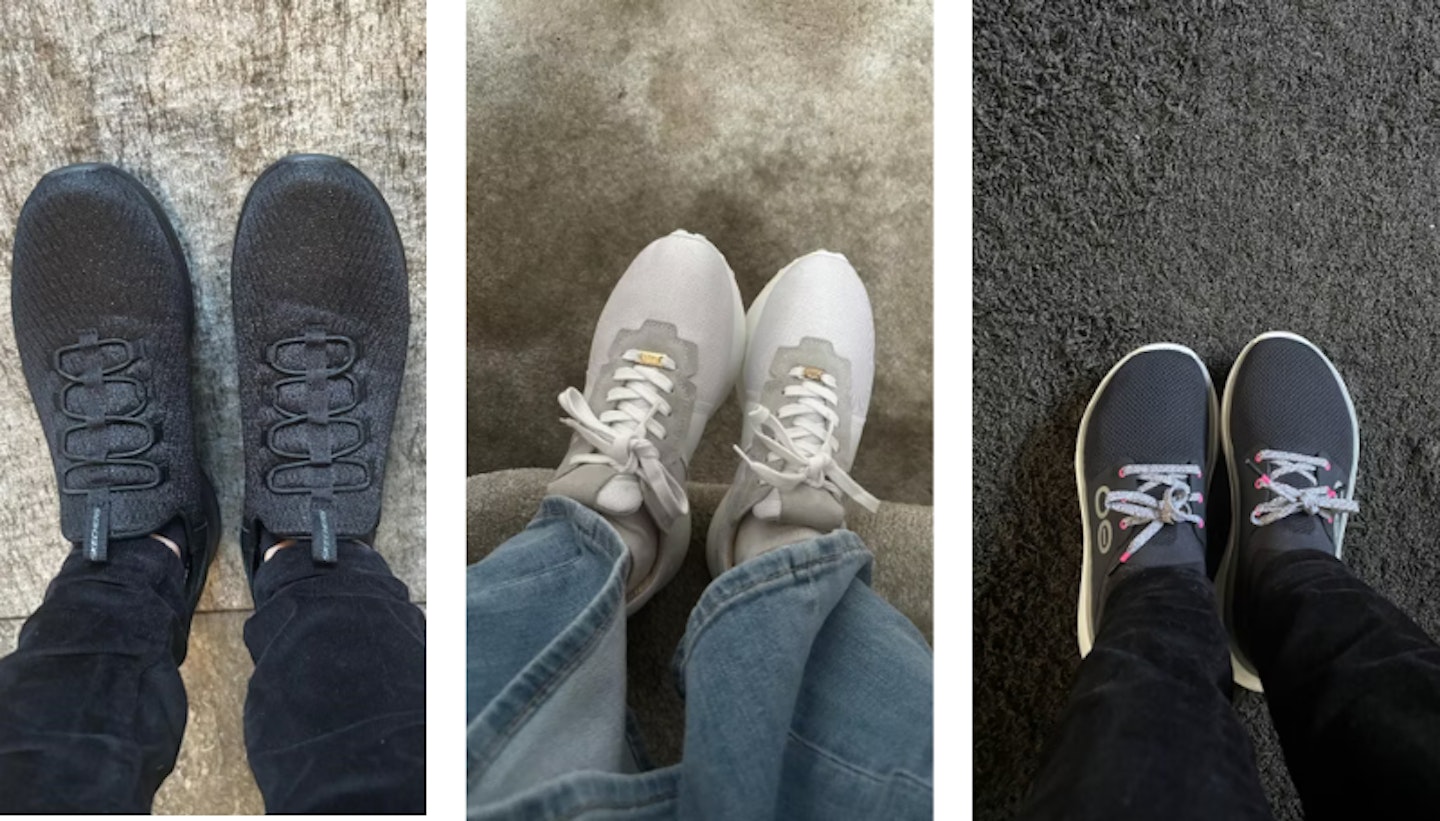
Best trainers for plantar fasciitis
While some companies, such as Fitville, make trainers specifically for plantar fasciitis, it isn’t all that common to have specific trainers for the condition, so when searching for the best plantar fasciitis trainers, it’s important to know what features to look for. As well as arch support and cushioned heels, you’ll want to look for trainers that have effective shock absorption properties. This is to reduce the impact of each step on your foot, which will take pressure off the areas affected by plantar fasciitis. The right trainers will give you proper support to prevent you from making the injury worse while helping to improve your mobility by ensuring every step you take is as comfortable as possible.
This is why finding a pair of trainers with arch support that also fit you perfectly to provide extra support and cushioning is vital for anyone experiencing the symptoms. With that in mind, as a plantar fasciitis sufferer, these are some of the best trainers for walking to keep your feet comfortable and reduce pain. Trust me, these have been put through their paces and put a spring back in to my step. For context, I am a size 5 (UK 38) but in some shoes find a 5.5, or even a 6 fit me.
How we tested the best trainers for plantar fasciitis
We asked Suzanne Baum, a 51-year-old award-winning beauty and fitness editor, to test the best trainers for plantar fasciitis. Suzanne has written about fitness, fashion and beauty for over 20 years, and also suffers with the pain of plantar fasciitis.
We sourced eight pairs of trainers on this list and asked Suzanne to try them for an extended period of time. We then considered a number of factors including– the way the trainers fit the feet, ease of getting on and off, reduction in pain of plantar fasciitis, style, price and value. All our reviews are honest and we include both the positive and negative comments.
To find the best walking trainers for plantar fasciitis, Suzanne carried out hands-on testing over several weeks. Each pair was worn during daily walks, from short errands to extended strolls on varied surfaces like pavements, parks, and light trails. We focused on real-world comfort and performance, paying close attention to how the trainers supported the arch and heel over time.
We evaluated each trainer based on the following:
-
Heel and arch support: How well the shoes alleviated pressure on the plantar fascia
-
Cushioning and shock absorption: Especially in the heel area
-
Stability and foot alignment: To reduce strain during movement
-
Fit and comfort during long walks: Including toe box space and overall structure
The goal was to identify trainers that not only offer relief but also allow for comfortable, pain-free walking—day in and day out.
Best trainers for plantar fasciitis
Best trainers for plantar fasciitis
The best way I can describe these shoes is like a comforting hug to my feet. I tend to walk around 12k steps a day - with my daily dog walk and trip to and from the tube for work - and when my plantar fasciitis is bad, I can’t wait to swap my shoes for my slippers. Yet the thing about these trainers is that they provide the same level of comfort as my slippers, if not better.
As one reviewer commented: “It feels like I am walking on clouds in these shoes”, and I am in total agreement. The shoe is the latest launch to the popular brand and I cannot recommend it highly enough. Aesthetically I love the design of the fine knit material which is a great breathable fabric and even though I wore these shoes for walking, not running, at no point did I feel my feet were getting sweaty, even on hot days. However, I'm not sure how dry my feet might be if it rained or i stepped in a puddle. The heel of the shoe is quite high as it contains a cushioned pillow like material that not only held my foot in snugly and gave a bounce to my stride, but gave me height too which I loved. According to the website, the rounded OOfoam™ heel geometry is created to enhance impact absorption and when normally I would feel a plantar fasciitis twinge in my left foot as it hits the ground, in these shoes I felt nothing thanks to this design.
For all these reasons, plus the fact the front of the shoe has a large foot bed for the toes to spread, rather than be pushed together, the OOmy Stride makes the top spot. Expensive but great value for money as these will be worn on repeat due to their comfort factor!
Pros
- Easy to slip on and off
- Material a very breathable fabric so feet don’t get sweaty
- Helped keep plantar fasciitis pain at bay
Cons
- Fine knit material is not ideal to wear in the rain or on very cold days
A hands free super comfy trainer that you can slip on and off is perfect for me - these are hassle-free, making them the best everyday comfort for plantar fasciitis. I love the black knit fabric that is so soft it almost feels like jelly, yet once on really holds the foot in place securely. I also like the fact it has no laces. In terms of comfort factor, it ticks all the right boxes with its air-cooled memory foam cushioned insole that helps keep the foot protected. It also has a slip resistance outsole which really helps if you suffer from plantar fasciitis as it stops the foot from moving awkwardly; something that can trigger my sore spot. I can wear these all day with no pain!
The only slight con is that they don't have as high a heel as some of the other trainers I've tested here so don't give you as much height of that's something you want in a trainer.
Pros
- Affordable price point
- Easy to slip on and off
- Memory foam for a soft feel
Cons
- 1-inch heel, so doesn’t give you as much height as other shoes mentioned here
Best budget trainers for plantar fasciitis
www.pavers.co.uk
These lace up leather trainers look a lot more expensive than they are and fit true to size. They have a fairly wide fit which I thought might not give my feet the support they needed but that wasn’t the case. Although leather can often feel heavy, these are super lightweight and I felt I could wear them all day. The memory foam insole really felt as though it was taking pressure off the plantar fascia, which meant these were an absolute pleasure to wear.
As for the design (they have little raised sparkles on them), one user wrote: “These shoes are certainly eye-catching, they have been much admired,” with another saying “these shoes are very comfortable and stylish, love the sparkly bling, very happy with them.”
Some reviewers have said the squeak when walking but this wasn't something I noticed.
Again, the fact you can slip them on and off with a zip, rather than tie up the shoes every time you wear them, is a bonus. These are real multi-tasking shoes – I keep them by the front door and wear them to the shops, out to meet friends and to work.
Pros
- Side zip gives easy access
- Lightweight build
- Sparkly design catches the light
Cons
- Some users say they squeak on the floor, although I did not experience this
4.
Calla Cosmos
My plantar fasciitis has meant I have been unable to wear high heeled shoes for the past nine months, so I am always looking for a fashionable alternative. These trainers are absolutely amazing when it comes to the comfort factor, but on a practicality level they are sadly too nice to wear on a daily basis.
If you are new to the brand, you are probably lucky enough not to have feet issues as Calla has become synonymous for its fashionable footwear that is crafted to provide comfort for women suffering with everything from bunions to plantar fasciitis. I wore these soft leather shoes to a work event where I was on my feet for eight hours and they felt magical. I’m so used to feeling a bit grumpy when the pain in my heel starts to throb but I was so conscious they didn’t aggravate my plantar fasciitis at all. In fact, it disappeared. Thanks to the arch supported insole, you don’t feel the impact of the foot touching the ground, and I definitely thought the trainers had a larger toe box in the shoes as my toes had plenty of wiggle room. I’m also a fan of the 3cm sole which made these very feminine shoes a cool look worn with jeans or a midi dress.
They are on the pricer side but I personally think they're a great investment that go with so many of my outfits that it'll definitely get my money's worth.
One reviewer praised the shoes, saying: “Finally a shoe that fits and can be worn all day! I have a large bunion and hammer toe on one foot and also plantar fasciitis and have struggled to find a comfortable walking shoe until now.”
Pros
- Comes in wide fit (up to EEE)
- Extremely fashionable
- Comfort level 10/10
Cons
- Quite pricey
Although I don’t do proper hikes, I do a lot of off road trail dog walks on weekends, which have me on my feet for at least two hours. And having put these shoes through their paces over the past two weekend walks, they have totally lived up to my high expectations (a lot of my friends swear by HOKA as being their go-to for trainers).
I loved the look of them and the cosmic pearl/oatmilk colour is very original and looked really nice with my black leggings. Being waterproof is a huge bonus as it made a nice difference to my usual walking boots that give me zero comfort when my plantar fasciitis is bad. And it was also a welcome change to wear a mid-height shoe, as opposed to a normal trainer, which sat perfectly on my ankle, without causing the skin to rub. The quick toggle lace meant I didn’t need to tie them up, you just slip them on to your feet and pull the toggle tight. The shoes felt so bouncy on, at times I felt I could break out in to a sprint with them as they power the feet on. An engineered knitted fabric meant my feet were kept non-sweaty throughout my walks and I was pleasantly surprised that this material didn’t let water in when it rained. However, after a long walk my feet did feel a bit heavy.
One user described these shoes as having a “Solid construction and being super stylish,” adding “it will be hard not to wear these for everyday errands in addition to trails.” I agree and will be wearing them for both!
Pros
- Waterproof
- Endorsed by podiatrists
- Designed for use on all terrain
Cons
- Feet did feel a tiny bit heavy towards the end of my walk
| Sizes: | UK 3.5-10.5 (regular and wide width available across a range of colours) |
These shoes come in wide or extra wide fit and offer ample space for your feet. Although I don’t necessarily have wide feet, I do have corns on my little toe which hurt in normal trainers and in these they didn’t rub against the fabric at all and I was aware they were very spacious. I have been wearing these shoes on the treadmill at the gym and they are super sturdy, holding my foot in place and not hurting the sole as it impacted with the treadmill. The high instep design is very obvious when you put the shoes on as it kind of bends to the curve of the foot.
Customers have said that they fit nicely, with many agreeing the cushioned heel support and wide fit has brought welcome relief to their feet. My only gripe is they make my feet look bigger than they actually are.
Pros
- Supportive sole that provides comfort as well as heel, arch and ankle support
- Wide toe box - perfect if you have wide feet
- Half sizes available
Cons
- May make your feet appear slightly larger due to chunky style
| Sizes: | UK 3.5-9.5 (wide and extra wide widths available) |
Best plantar fasciitis trainers for cushioning
www.tradeinn.com
I have to start off by saying these only start in a size 6 (39) but as I am in between a 5/6, they actually fitted like a glove. Although they are named as hiking shoes, I actually wore them to run in as they were so comfortable. As those with plantar fasciitis know, the pain can often be unbearable but these really helped alleviate the stabbing sensation I was feeling on and off on the days I wore them as they’re super cushioning. Not only is the sole cushioned but the support around the ankle is too so the foot feels snug and I felt a slight bounce to my stride on my run. I actually have managed a few 5k runs in these shoes and at no point did I experience any discomfort, which is a miracle as I’ve not really been able to exercise as much as I used too with the onset of plantar fasciitis.
Customers say they love the wide fit at the front of the shoe, and the lightweight of the material. “It feels like I’m walking on clouds in these shoes,” wrote one user, which I think pretty much sums these up.
Pros
- Wide toe box
- Excellent cushion support
- Multi-directional traction
Cons
- Only starts in a size 6
Trainers for plantar fasciitis we’re currently testing
We're currently testing the trainers for plantar fasciitis listed below and will update this page with our findings. We still wanted to include them in this round-up as they have received some excellent reviews from customers online.
Best trainers for plantar fasciitis offering orthopaedic support
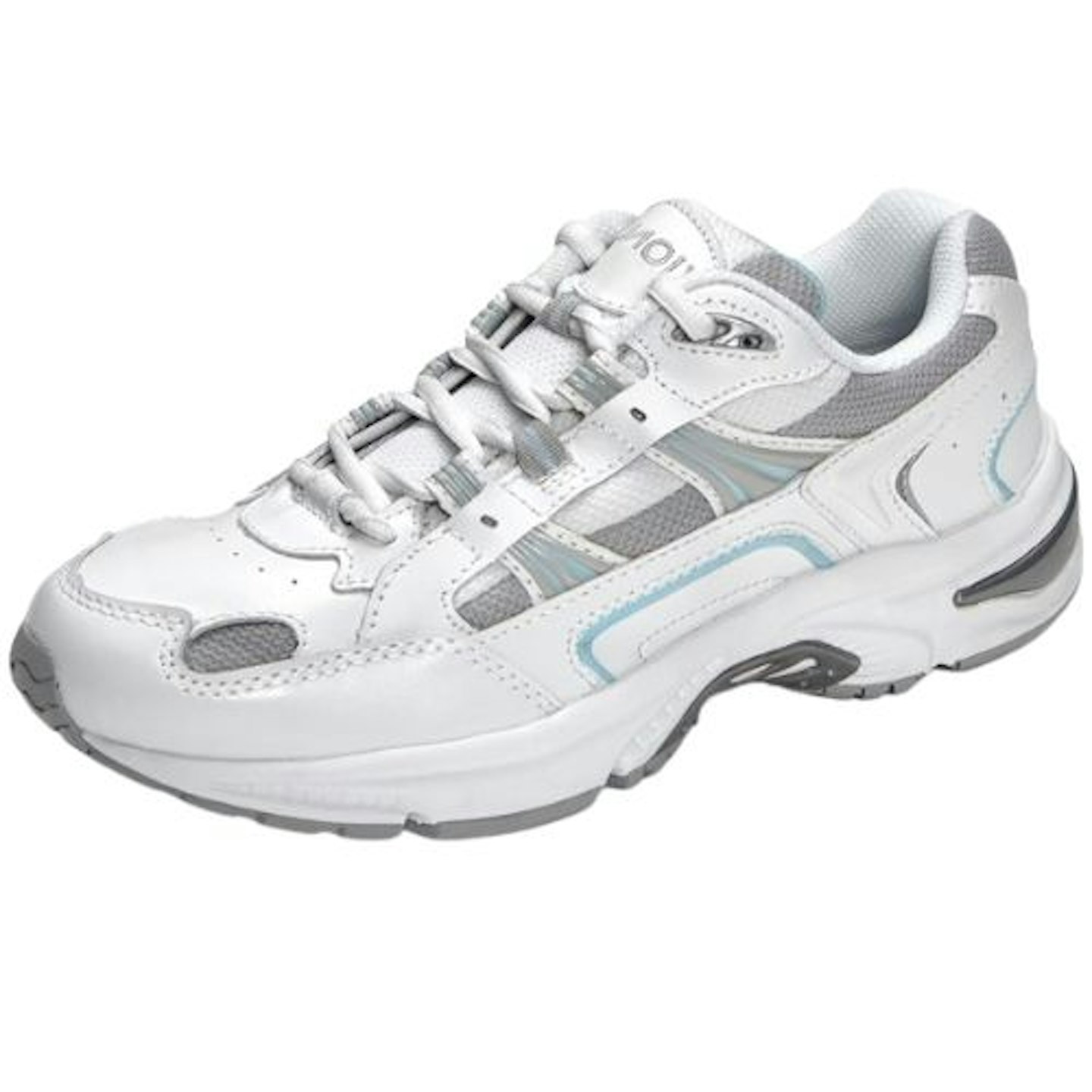 Vionic/Amazon UK
Vionic/Amazon UKOffering stability, cushioning, arch support and flexibility, the Vionic Walker Women's Trainers are designed to help alleviate heel pain often caused by plantar fasciitis or Achilles tendonitis.
They're equipped with 'vio motion' technology, created by the brand to help correct pronation while promoting full-body alignment. They have a special orthotic insole that will provide your arches with the extra cushioning and support they need to ensure you can keep moving with maximum comfort.
Pros
- Designed to help alleviate heel pain
- Promotes full-body alignment
- Orthopaedic sole
Cons
- Can feel tight and uncomfortable when you first put them on but you need to allow time to break them in
| Sizes: | UK 3-8.5 (wide widths available) |
Best trainers for plantar fasciitis for everyday comfort
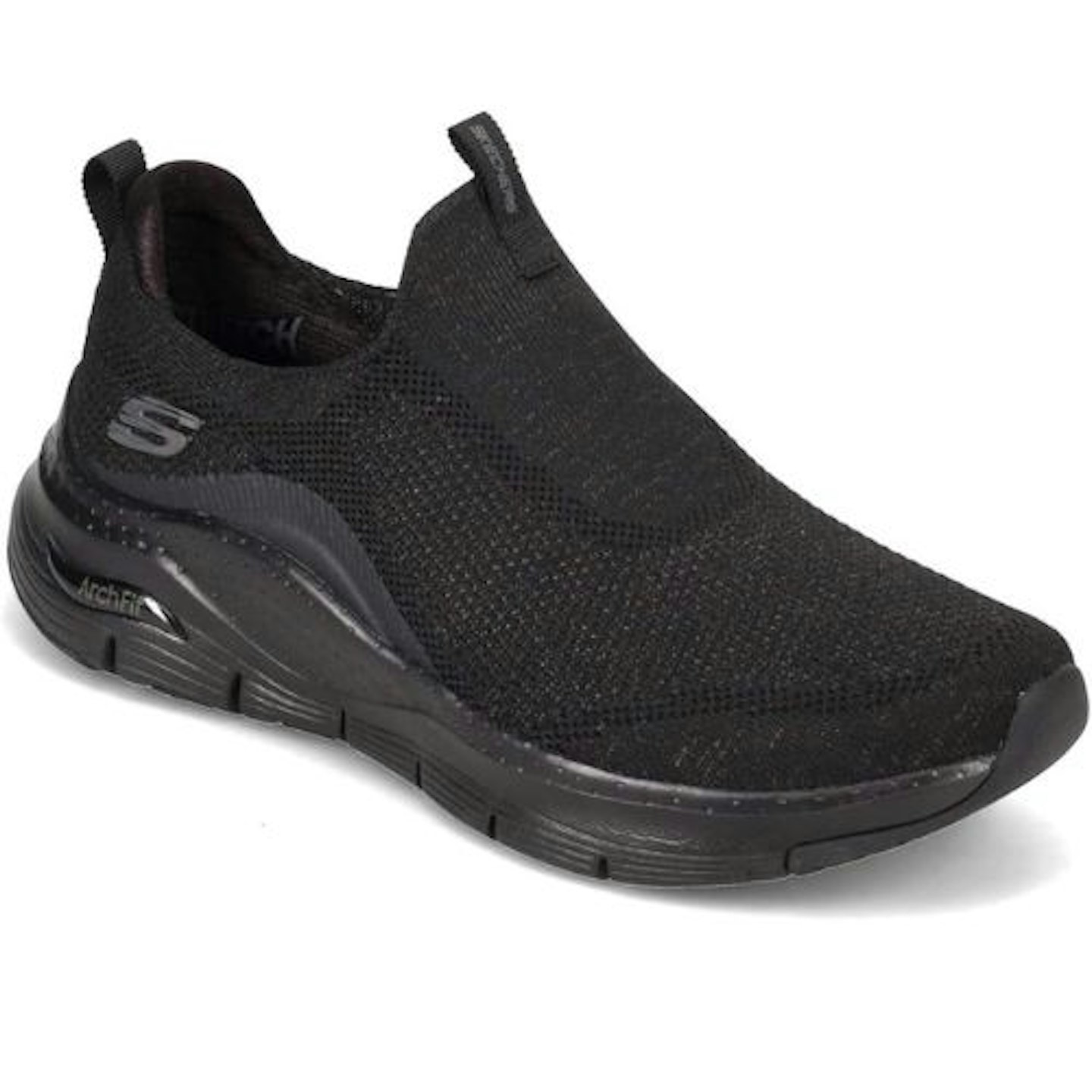 Skechers
Skecherswww.skechers.co.uk
Run your daily errands in complete supportive comfort by wearing the Skechers Arch Fit - Keep It Up trainers. Sketchers has used 20 years of data and 120,000 unweighted foot scans to design these shoes so everything about them, from the shoe to the insole inside, has been developed with the help of podiatrists.
Featuring a breathable engineered knit super in a Stretch Fit pull-on style trainer, they promise sock-like comfort with a Sketchers Arch Fit insole for arch support, which helps mould to your foot to reduce shock and increase weight dispersion to take some of the pressure off the parts of your foot where plantar fasciitis is causing you pain.
Customers said that "these are so comfortable right out of the box" and that they can wear them all day with little to no pain.
Pros
- Sock-style comfort
- Easy to pull on
- Inner sole helps disperse weight to take pressure off certain parts of your foot
Cons
- Wide fit not available
| Sizes: | UK 2-8 (standard width only) |
Best plantar fasciitis trainers for pronation control
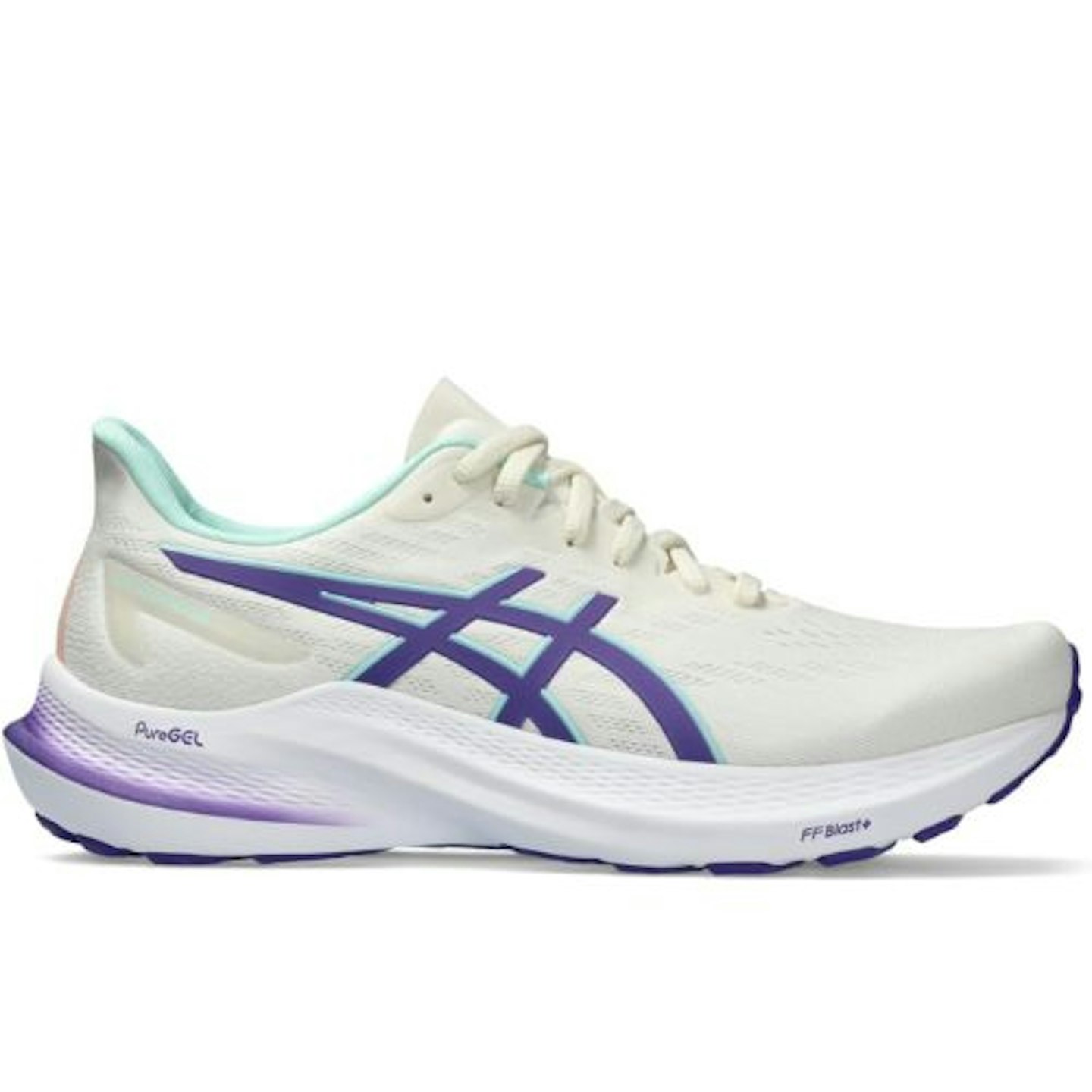 ASICS
ASICSThe Asics GT-2000 12 trainers are a great option for those with overpronation, which is quite common for people with plantar fasciitis to have, as they help with pronation control. If you're not sure what that is, it is all to do with the way your foot lands on surfaces when you walk or run.
Those with overpronation tend to put extra pressure on certain parts of their foot as the 'shock' of your landing isn't absorbed evenly throughout your foot. These trainers are designed to provide extra stability by guiding your foot in a natural way and it has PureGEL technology to improve softness on your feet with added shock absorption to reduce impact.
Inside there is an OrthoLite sock liner and FF blast plus foam which provide step-in comfort and lightweight cushioning. Customers said that they are very comfortable shoes and that they also look great too.
Pros
- Provide extra stability and shock absorbance
- Comfortable and cushioning
- Small reflective details for improved visibility in low-light conditions
Cons
- One width available
| Sizes: | UK 3-11 (standard width only) |
Best plantar fasciitis trainers for cushioning
 New Balance
New BalanceAs those with plantar fasciitis know, having the condition can make it feel like you've got a stabbing pain in your heel whenever you walk, but the New Balance Fresh Foam X 1080v13 Shoes should help alleviate some of it as they're super cushioning.
They're designed with lots of foam, both underfoot and throughout the midsole, which will make you feel like you're walking on a cloud with every step you take. With an ultra-modern look on the outside, these trainers offer a breathable yet supportive fit, thanks to the engineered mesh upper.
Available in a variety of colours, customers say that they can now stand for hours at a time without experiencing the discomfort that they did before. One pointed out that "if you have wide feet - they are still comfy and not too tight that it causes pain or cramping, but I can see the side of my foot poking out of the soft mesh a bit".
Pros
- Cushioning foam
- Breathable design
- Look fashionable
Cons
- Reviewers mention they might be on the narrow side for some
| Sizes: | UK 3-9 (standard width) |
Best plantar fasciitis trainers for wide feet
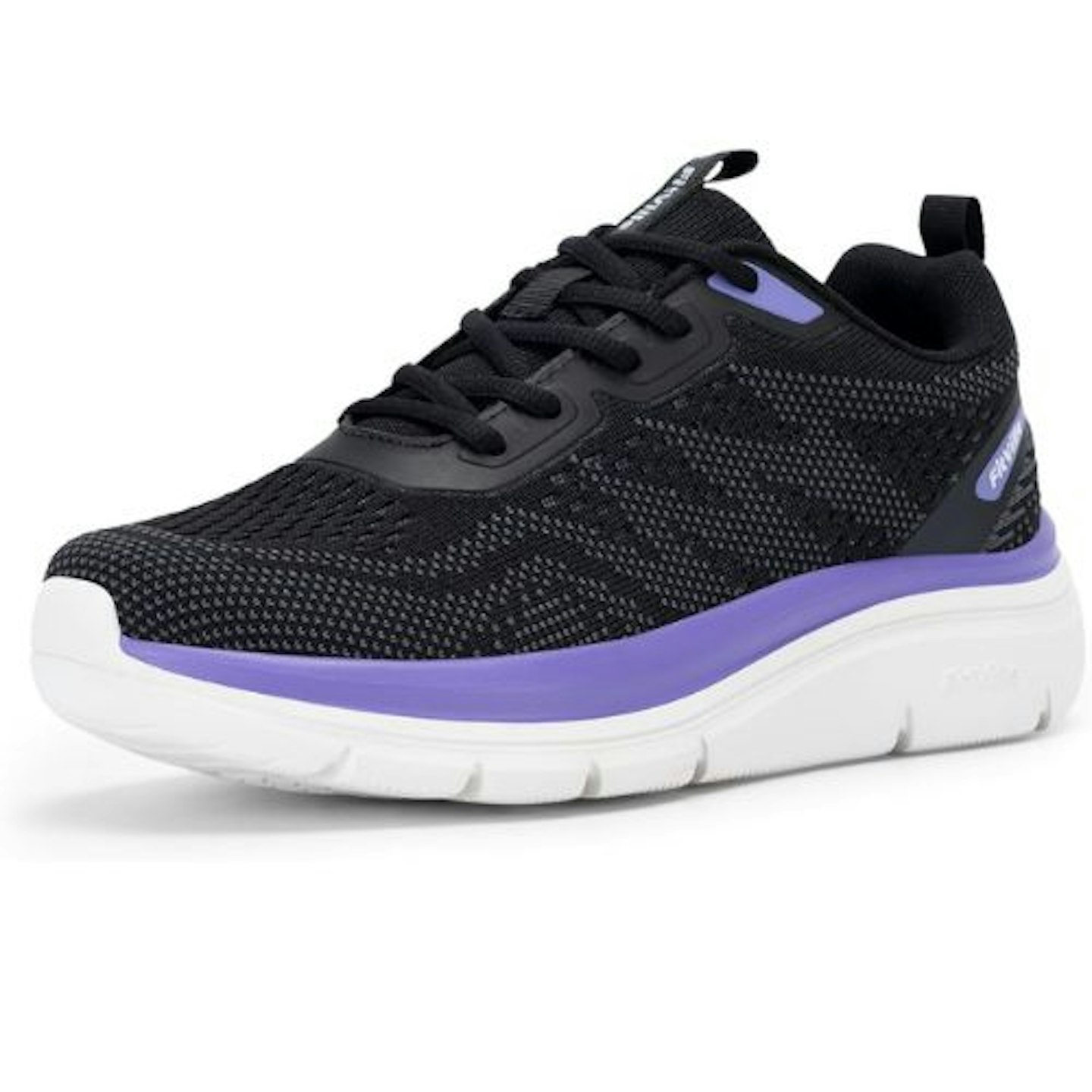 FitVille
FitVilleAvailable in an EE width fitting with a roomy toe box, the FitVille Women's Cloud Wanderer V8 trainers offer ample space for your feet. As well as providing a fabulous fit for those needing a wider fit trainer, they are designed to provide heel pain relief, thanks to the cushioning innersole and the 5cm high EVA sole for optimal shock absorption.
They're made with a high-elastic knit upper for added stretch and breathability, plus they're machine washable so you keep them as fresh as can be and odour-free. Customers have said that they fit nicely, with one saying "These trainers are wide enough to fit my L ankle which sticks out with extra bone due to arthritis. They are very comfortable, when out on a walk.".
Pros
- Wide and spacious toe box
- EVA sole for optimal shock absorption
- Machine washable
Cons
- One reviewer found the trainers rubbed on their feet when they first arrived
| Sizes: | UK 3.5-8.5 (standard and wide widths available) |
Choosing the best trainers for plantar fasciitis buyer's guide
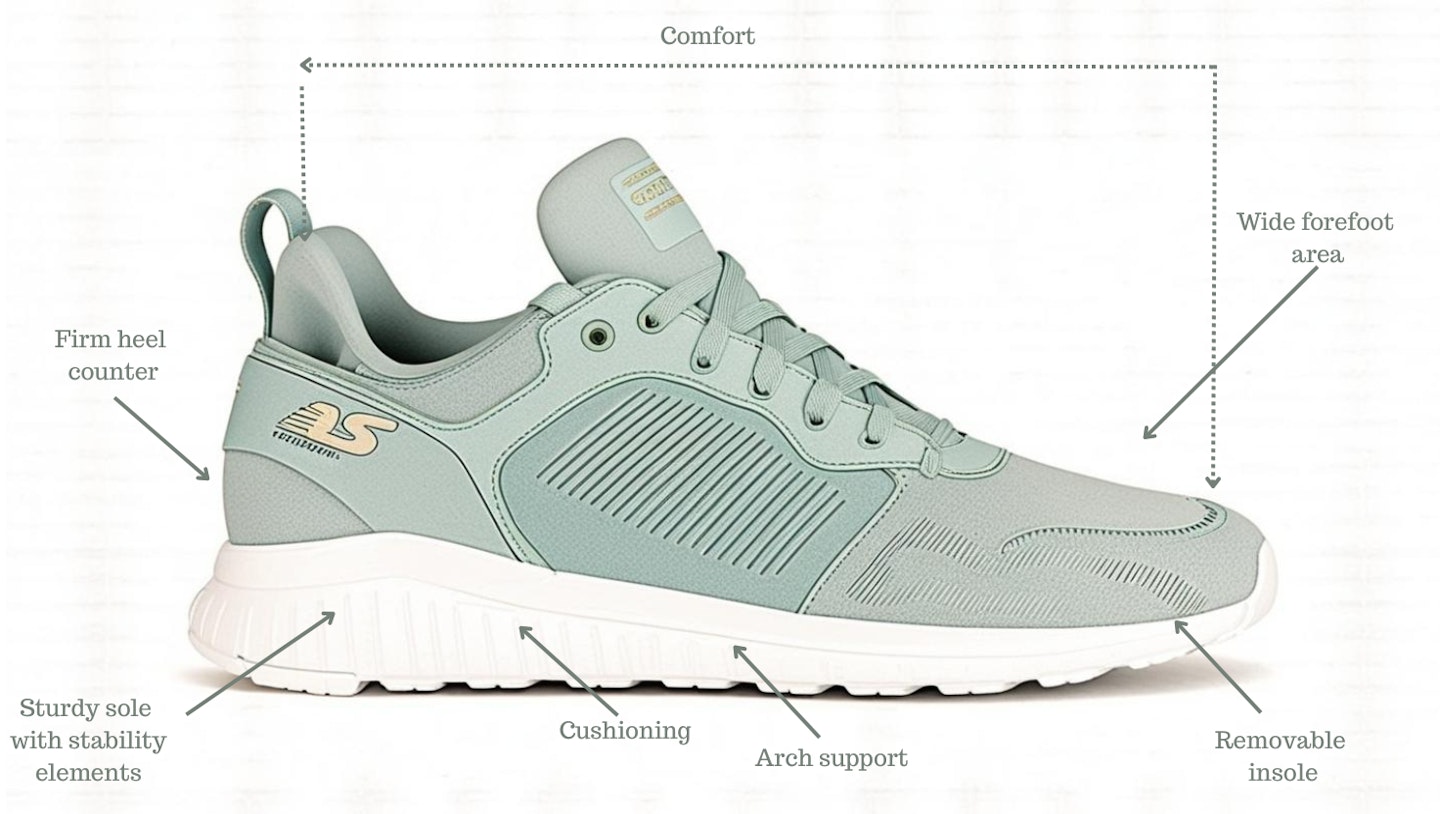
Plantar fasciitis can make walking and staying active challenging, but the right pair of trainers can ease discomfort and support healing. In conjunction with pain relief and gentle stretching, the NHS recommends wearing "shoes with cushioned heels and good arch support" or using "insoles or heel pads in your shoes" to ease plantar fasciitis yourself.
Here’s what to look for:
1. Strong Arch Support
The plantar fascia is a band of tissue that supports your foot’s arch. Trainers with firm, contoured arch support can help reduce tension on the fascia, which is key for pain relief.
Tip: Look for shoes labeled as “orthopedic” or “motion control” if you have flat feet or high arches.
2. Cushioned Heel
Since plantar fasciitis pain is often concentrated in the heel, extra padding in this area can absorb impact and lessen discomfort—especially on hard surfaces.
Look for: EVA foam, gel, or air-cushioned midsoles.
3. Deep Heel Cup
A deep heel cup cradles your heel securely, improving alignment and reducing stress on your foot with every step. It’s especially useful if you tend to roll your foot inward (overpronation).
4. Firm Yet Flexible Sole
Your shoes should bend at the ball of the foot but feel stable throughout the arch and heel. Too much flexibility in the midsole can lead to poor support.
5. Wide Toe Box
A roomy toe area reduces pressure and allows your toes to splay naturally, which can help balance your stride and reduce tension in the foot.
6. Supportive Upper
Mesh or knit uppers that hug the foot (but aren’t too tight) help keep your foot secure while allowing breathability—ideal for long walks.
7. Low to Moderate Heel Drop
Heel drop refers to the height difference between the heel and the toe. A moderate drop (around 6–10mm) often provides the best balance of heel cushioning and arch support.
Buying your new trainers
It's worth getting professionally measured to ensure your footwear completely supports your foot. The following stores offer a shoe fitting service:
Clarks: Measure & Fit in-store and a personal shopping service for adults.
Cotswold Outdoor: Book an appointment for a running shoe gait analysis or outdoor footwear fitting.
Shuropody: Book a biomechanical foot assessment.
Get the best fit with these shopping tips
Shop later in the day – Try on shoes in the afternoon as feet tend to swell during the day, this will give you a truer fit.
Bring your own socks – It's worth trying on the trainers with the socks that you usually wear, so you factor in their thickness.
Can you return them? Some stores allow you to try footwear at home and return them if they are not working out.
Best trainers for plantar fasciitis FAQs
What causes plantar fasciitis?
The NHS says that plantar fasciitis is caused by straining the part of your foot that connects your heel bone to your toes (plantar fascia) but it's not always clear why this happens.
You may be more likely to get plantar fasciitis if you:
• Are 40 to 60 years of age
• Recently started exercising on hard surfaces
• Exercise with a tight calf or heel
• Overstretch the sole of your foot during exercise
• Recently started doing a lot more walking, running or standing up
• Wear shoes with poor cushioning or support
• Are very overweight
How long does plantar fasciitis last?
As it’s not always clear what causes plantar fasciitis, how long you have the condition can vary from person to person. How long plantar fasciitis lasts can depend on a couple of factors, such as how severe it is in the first place, your personal circumstances and health overall, and what you’re doing to help treat it. With the right treatment, Plantar fasciitis can be gone within a couple of months to a year.
What types of shoes are bad for plantar fasciitis?
Certain types of shoes can worsen the pain of plantar fasciitis, including flat shoes, high heels and shoes that don’t fit properly. Shoes without proper arch support or with stiff, rigid soles can often make the symptoms worse as well as shoes with thin soles as they provide hardly any cushioning or shock absorption properties.
We asked Trevor Prior, consultant podiatrist at Vionic Shoes about the types of shoes to avoid when you have plantar fasciitis. "In many cases, people who have developed plantar fasciitis have worn shoes with minimal heel height, a thin, hard sole and no built-in arch support. The types of shoes which may make plantar fasciitis worse include flat, slip-ons or pumps."
"You should avoid shoes with no or a low heel as this requires good calf muscle flexibility which many people with plantar fasciitis don’t have" says Trevor. "If you’re wearing a flat or low-heeled shoe and if your calf muscle is already tight, it will increase strain on the plantar fascia."
What are the best trainers for plantar fasciitis?
As we’ve mentioned previously, the best trainers for plantar fasciitis are ones that provide extra support and cushioning to take the strain off the bottom of your foot, around your heel and arch. Trevor Prior recommends orthopaedic trainers to help address the problems with plantar fasciitis, as well as fallen arches, bunions, arthritis, joint pain and several other conditions.
"Trainers with built-in orthotics help to reduce unwanted movement of the foot and ankle bones, thereby allowing you to reclaim your natural footprint. In turn, this can help alleviate problems in other parts of the body. Orthotics also give a more even weight distribution, take pressure off sore spots, such as the ball of the foot, corns or bunions, and they can also provide shock absorption."
We think one of the best pairs of plantar fasciitis trainers on our list are the FitVille Women's Rebound Core Shoes. They offer extra support to the areas where plantar fasciitis causes pain and have an ergonomic arch support and a shock-absorbing design to ensure your feet are as comfortable as possible.
How to relieve the symptoms of plantar fasciitis
Advice from the NHS suggests to try these things at home to relieve the symptoms:
• Rest and raise your foot on a stool when you can
• Put an ice pack (or bag of frozen peas) in a towel on the painful area for up to 20 minutes every two to three hours
• Wear shoes with cushioned heels and good arch support
• Use insoles or heel pads in your shoes
• Try regular gentle stretching exercises
• Try exercises that do not put pressure on your feet, such as swimming
• Take painkillers like paracetamol and ibuprofen
• Try to lose weight if you’re overweight
If your plantar fasciitis doesn’t get better with treatment at home, your GP could suggest you visit a podiatrist for more specialist foot care. NHS podiatrists are quite rare so this will probably be something you would need to arrange privately.
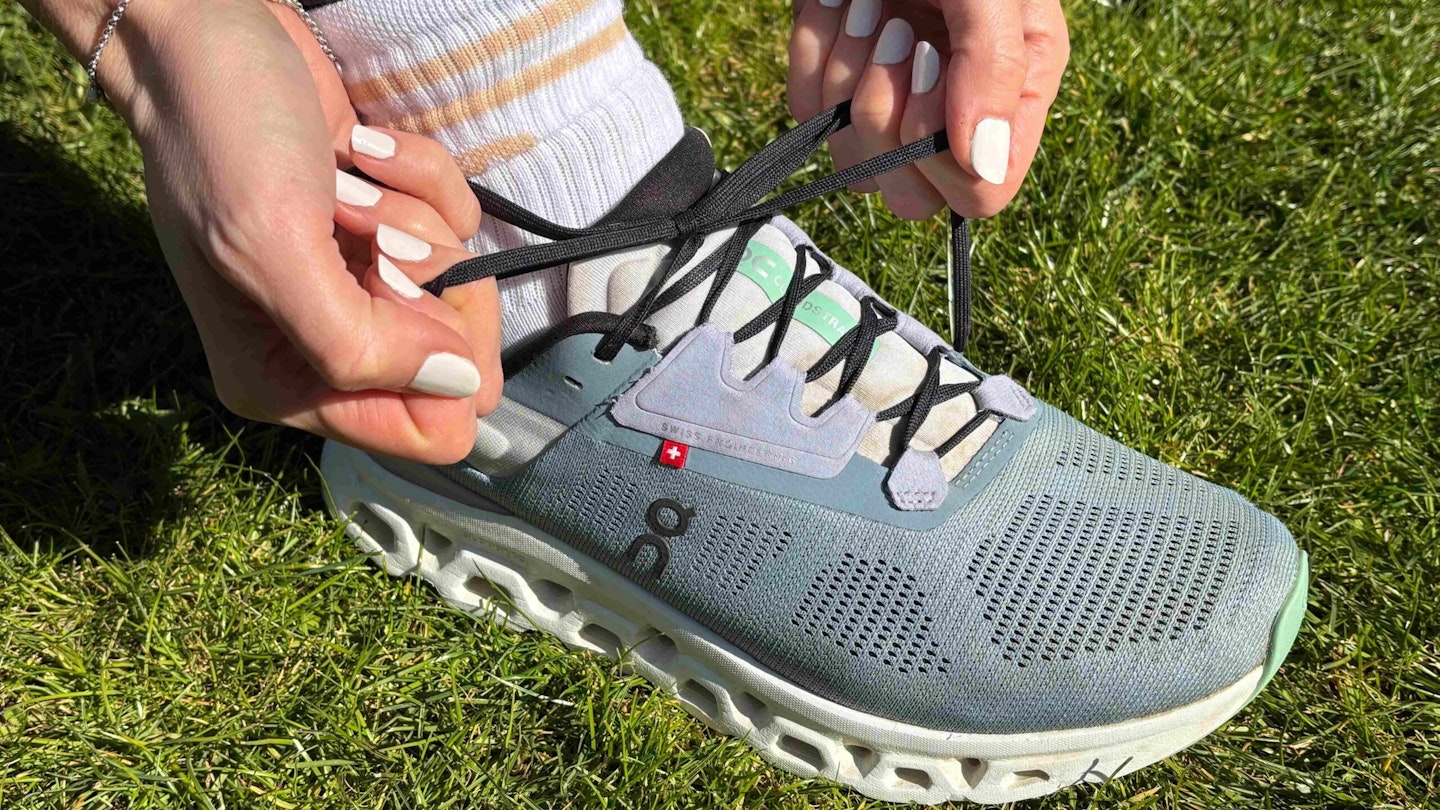
Meet the experts:
This article contains advice from Trevor Prior. Trevor has been practising as a podiatrist for over 40 years. He has also worked extensively with elite and professional sportsmen and women in a wide range of disciplines, including football, rugby, cricket, athletics, hockey and badminton.
Sammy Margo is a highly experienced physiotherapist who runs Sammy Margo Physiotherapy which is recognised by London's leading consultants, surgeons and GP’s as a provider of first class physiotherapy care. She has been awarded a qualification in Aerobics and Pilates and she also holds membership with the Manipulative Association of Chartered Physiotherapists (MACP).
Rosie Floyd is a Pets, Homes and Garden Product Writer for Yours, specialising in home appliances, décor and furnishings, as well as all things dogs. After completing her Journalism & Media degree from Coventry University back in 2015, she started her career writing about must-visit holiday destinations, moving on to creating content around outdoor living and garden buildings, before joining the team at Bauer.
























